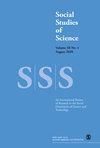The fall and rise of Iruda: Reassembling AI through ethics-in-action.
IF 2.7
2区 社会学
Q1 HISTORY & PHILOSOPHY OF SCIENCE
引用次数: 0
Abstract
This paper examines the case of Iruda, an AI chatbot launched in December 2020 by the South Korean startup Scatter Lab. Iruda quickly became the center of a controversy, because of inappropriate remarks and sexual exchanges. As conversations between Iruda and users spread through online communities, the controversy expanded to other issues, including hate speech against minorities and privacy violations. Under public pressure, Scatter Lab quickly suspended Iruda on 12 January 2021. After implementing extensive changes, the company relaunched the chatbot as Iruda 2.0 in October 2022. Notably, this revised version has operated without any major incidents as of mid-2025. This study offers a symmetrical analysis of Iruda's initial failure and subsequent success in terms of 'folds' connecting users, machines, algorithms, and other key elements. We introduce 'configuration' as a mode of folding and show how socio-material assemblages-whether harmful or safe-emerge as a result of different configurations. The success of Iruda 2.0 highlights the importance of placing ethics at the core of AI development and implementation strategies. In addition, we introduce the concept of 'ethics-in-action' to highlight the critical role of practical interventions and user engagement. By tracing Iruda's evolution in detail, this study provides practical guidelines for the successful integration of AI systems into society.伊鲁达的兴衰:通过行动中的伦理重组人工智能。
本文研究了由韩国创业公司Scatter Lab于2020年12月推出的人工智能聊天机器人Iruda的案例。由于不恰当的言论和性行为,伊鲁达迅速成为争议的中心。随着Iruda和用户之间的对话在网络社区传播,争议扩大到其他问题,包括针对少数民族的仇恨言论和侵犯隐私。在公众压力下,Scatter实验室于2021年1月12日迅速暂停了Iruda。在进行了广泛的修改后,该公司于2022年10月重新推出了聊天机器人“Iruda 2.0”。值得注意的是,到2025年中期,这一修订版本的运行没有发生任何重大事故。这项研究从连接用户、机器、算法和其他关键要素的“折叠”角度,对伊鲁达最初的失败和随后的成功进行了对称分析。我们将“结构”作为一种折叠模式引入,并展示了社会材料的组合——无论是有害的还是安全的——是如何因不同的结构而出现的。Iruda 2.0的成功凸显了将道德置于人工智能开发和实施战略核心的重要性。此外,我们引入了“行动中的伦理”的概念,以强调实际干预和用户参与的关键作用。通过详细追踪伊鲁达的演变,本研究为人工智能系统成功融入社会提供了实用指南。
本文章由计算机程序翻译,如有差异,请以英文原文为准。
求助全文
约1分钟内获得全文
求助全文
来源期刊

Social Studies of Science
管理科学-科学史与科学哲学
CiteScore
5.70
自引率
6.70%
发文量
45
审稿时长
>12 weeks
期刊介绍:
Social Studies of Science is an international peer reviewed journal that encourages submissions of original research on science, technology and medicine. The journal is multidisciplinary, publishing work from a range of fields including: political science, sociology, economics, history, philosophy, psychology social anthropology, legal and educational disciplines. This journal is a member of the Committee on Publication Ethics (COPE)
 求助内容:
求助内容: 应助结果提醒方式:
应助结果提醒方式:


